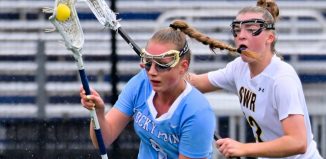Tensions swelled inside the Rocky Point High School auditorium during a special meeting of the Rocky Point school district board of education on Thursday, July 28.
In early July, the board reversed its longstanding practice regarding book donations, deciding to no longer accept books from the public. The controversy centers around a June donation made by district parent Allison Villafane, who donated several books exploring themes dealing with sexuality, gender identity and race during Pride Month.
“This past June, in keeping with my past practice, I have donated books to promote diversity, equity and inclusion,” she told the board. “These books were best sellers, approved by the library here.”
In an interview, Villafane shared the list of the seven titles that were included in the donation, saying these books were intended to be spread out across different schools throughout the district depending upon age appropriateness. The titles are:
- “Hidden Figures: The True Story of Four Black Women and the Space Race” by Margot Lee Shetterly
- “All Different and Beautiful: A Children’s Book about Diversity, Kindness, and Friendships” by Belle Belrose
- “Our Diversity Makes Us Stronger: Social Emotional Book for Kids about Diversity and Kindness” by Elizabeth Cole
- “Stamped (For Kids): Racism, Antiracism, and You” by Jason Reynolds and Ibram X. Kendi
- “The 1619 Project: Born on the Water” by Nikole Hannah-Jones and Renée Watson
- “Pink Is for Boys” by Robb Pearlman
- “The List of Things That Will Not Change” by Rebecca Stead
Jessica Ward, president of the board of education, defended the decision. She said the board did not take its decision lightly and that all five members of the board had arrived at its determination together.
Ward told the public that the decision was motivated by a basic lack of expertise on how to evaluate children’s literature.
“None of us — the five of us on the board — are experts in children’s literature,” Ward said. “None of us has a master’s degree in library science … so we thought it would be best for all of our schools to allow our librarians, who are the experts in children’s literature, to populate their libraries and their catalogs with books of their choosing.”
Villafane detailed her past practice of donating materials, saying she has made several rounds of donations over the years as each of her four children has moved through the school district. In the past, Villafane has donated materials regarding food allergies. In other years, they would focus on promoting diversity or compassion.
She said this most recent donation is not a significant departure from her past practice. Because the books were already in circulation in various school libraries throughout the district, Villafane believed she was performing a service to the school by making the approved books more accessible.
Villafane suggested the board was applying an arbitrary standard to her donation, asking if the board would apply this same standard to the donations of gifts such as piano keyboards and trumpets.
Responding to these charges, Ward said that the board’s decision “wasn’t necessarily in response to the books that you donated. It was in response to all books.”
She added, “Our current policy says … that we may accept gifts, grants … as well as other merchandise. If there was something else [such as] a musical instrument or some other educational or instructional item that you or someone wanted to donate, then we would take that on a case-by-case basis, but we are not taking any donations of books.”
Along with Villafane, other members of the public joined in their criticism of the board’s decision. Ernestine Franco, a resident of Sound Beach, said the board did not apply reason to its decision and that it failed to properly consider the consequences.
“If it was just a change of practice, then they did it very badly,” she said in an interview. “That’s what makes me think it was a political move.” She added, “Even if they wanted to do what they did, there had to be some logic to it and there wasn’t.”
Bea Ruberto, also a Sound Beach resident, concurred with this assessment, arguing the decision was a product of hasty decision-making and primarily motivated by the board members’ political preferences.
“I am convinced that it is political,” Ruberto said in an interview. “I am also convinced that for them to do that, they didn’t look at the practice they had in the past on how to deal with and accept book donations.”
Despite criticism from the public, there were others who responded favorably. One such individual, identified as “Ms. Sarlo” in the meeting’s minutes, defended the decision. According to her, it is best for the board not to consider these materials as there is no universal agreement on their content.
“I think that the decision was the correct one because … not everybody agrees with all of the books,” she said. “There are so many more important things that we need to be talking about that the board could be spending time on instead of book donations.”
Franco disagreed with this assessment, suggesting that it minimizes the issues at stake and offers a convenient excuse for the board to rid itself of accountability.
“I think [Sarlo] was trying to validate what happened by saying it wasn’t important,” Franco said, adding, “But what’s important, at least to me, is not the book but what the book stands for, which is education. … Instead of opening up to a very diverse atmosphere, they’re trying to close up the atmosphere to what kids are going to be exposed to.”
Villafane suggested that the board’s new practice on book donations violates common sense. She believes the board can correct course by adopting a new policy allowing the acceptance of books for titles that are already in circulation.
“It’s not rocket science,” she said. “There is a database of books that have been approved for distribution at various grade levels, so as long as the book you want to donate is within that system, you should feel free to donate it.”
The Rocky Point board of education will reconvene on Monday, Aug. 29, at 7 p.m., where deliberations on book donations are likely to continue.







